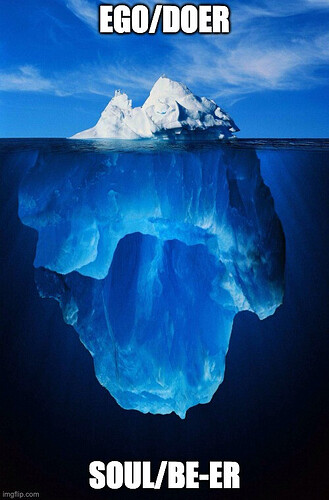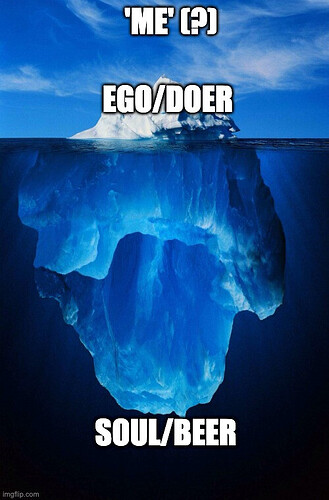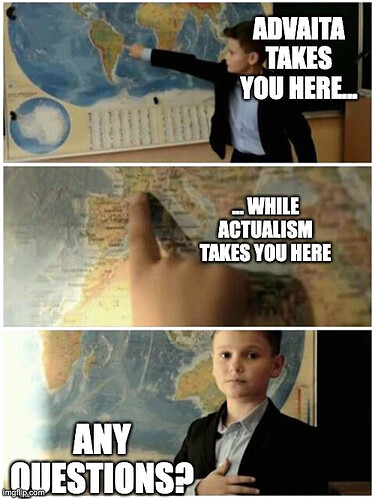I thought I’d expand a bit since I do remember being similarly confused of “but HOW do I do it ??”
There’s a few key components:
What ‘Belief’ Means in this Context
“Belief” is a bit of an overloaded English word. Consider these sentences:
- I believe in God.
1b. I believe that God exists.
1c. God exists.
- John is 30 years old or so, I believe.
- I believe I saw Carrie when I went to the store last week
Each one is slightly different.
#1 represents a belief in this actualist context sense - as “an emotion-backed thought” or “something you fervently wish to be true”. Note that obviously you don’t have to use the word ‘belief’ in the sentence to be stating a belief (1c is equivalent to 1 and 1b).
#2 is not an emotion-backed thought per se. It’s somebody assessing the facts (what the person looks like, what they know about them) combined with their life experience (what people of this age range look like and how their life situations tend to be) and making a guess or opinion as to what the case is.
#3 is also not an emotion-backed thought. It’s somebody making a best guess of what they think is the case based on possibly faulty memory.
Also consider:
- [regarding a business plan] I believe this plan will make our company profitable.
- [regarding a business plan] I believe this plan will make our company profitable.
These two are literally the same words but I wanted to distinguish that one can be a ‘belief’ (as an emotion-backed thought) and one not. #4 is a business that the planners have a lot of experience in, they’ve done it before, they know the ins and outs, and they make a decision based on what they think will work. This is a best-guess assessment, not an emotion-backed thought.
But #5 is where they really feel that if they keep advertising them chicken hot dog turkey chocolate burgers in the NY Times then it’ll work cause thats how their grandpappy did it and by God it’s gonna work this time too! This is just an emotion-backed thought that they believe will work without a particularly good reason so except emotional ones.
The basic distinction of all this is between “considering everything, this is what I think is the case” vs “I feel it, really feel it that this is right, it doesn’t matter what you say”.
These often get conflated into the same thing – but they are different beasts entirely. The dismantling of beliefs in actualism in particular deals with the latter, the “emotion-backed thought”. The rest of this piece will use the word ‘belief’ in this sense.
Sticking to the Facts
The essential way to dismantle a belief is to look at what the actual facts are. If you know what the facts are, you don’t need to believe that it’s the case – you simply know that it is.
Example: there is a device screen in front of you. You don’t have to believe there is a screen in front of you. You know it as a fact because you see it, it’s apparent via that sensory input. But you never see God in this sensory way – so you have to believe in God, since there are no facts that let you know of His/Her/Its existence (this is why you gotta have faith – and it’s even extolled as a virtue).
If you suddenly felt really strongly that there was a person standing behind you watching you — then you would just have to turn around and see there is no person. The fact (nothing behind your shoulder) dispels the belief (there is a person there). And if you do see a person then the fact (there is a person there) renders the belief redundant.
Essentially if you always start only from what you 100% actually know to be a fact, and you only follow chains of reasoning that are valid and only use those facts as their rational basis, then you will always be in fact-land and not in belief-land.
What is a Fact?
This raises the question of, what is a fact? It’s generally undisputed what a fact is. That’s why the Trumpian “alternative fact” was automatically seen to be ridiculous – because there is no ‘alternative’ to a fact. There are facts, and there are thing that aren’t facts.
Facts are things that are actually the case. Either something is currently the case, or something was the case in the past. (Etymology helps us here – the word “fact” comes from “Latin factum [… meaning …] “a thing done,” noun use of neuter of factus, past participle of facere “to do”” (source). It literally means “something that has actually happened”. ).
There can’t be any facts about the future because it didn’t happen yet. You don’t actually know the sun will rise tomorrow morning. You can assume it will (actually that the earth will rotate it into view again  ) because it happens so reliably, but something catastrophic could happen to the Sun, or the earth, or more likely than that you might get run over by a car and never see tomorrow. Although if that were to happen the sun would still rise, you just wouldn’t see it
) because it happens so reliably, but something catastrophic could happen to the Sun, or the earth, or more likely than that you might get run over by a car and never see tomorrow. Although if that were to happen the sun would still rise, you just wouldn’t see it  .
.
How do you know if something is the case now? Essentially you know it by your own experience of it, i.e. your senses. You see this, you sense this with touch, you hear this, etc. You know the fan is on cause you hear it whirring.
How do you know if something was the case in the past? With memory of having experienced it yourself. Then there are those things you didn’t personally witness. For this you rely on other people. You generally accept that people are talking about things that are the case. But when it comes to dismantling a belief it pays to be extremely stringent about what you accept to be the case, since people can make up all sorts of things to prop up their beliefs.
Also note that just because you can be mistaken about what is a fact (e.g. you think the fan is on in the living room but actually that whirring is some other thing making a noise from elsewhere) doesn’t change what a fact is. It just means you can be mistaken about what the facts are. But this doesn’t mean you believe the wrong thing – you just need to be presented with or find evidence that the thing you thought was a fact, wasn’t, and your understanding automatically adjusts.
Very Few Facts on the Ground
The initially tricky bit is that you will come to find with most things that there are very few actual facts. 99% of the time people are just spewing beliefs about this or that. Essentially 100% of political conversations are like this. People will spout rhetoric and fling statistics around – but statistics can be tricky and aren’t necessarily factual, or they can present facts in a misleading way.
“Republicans are destroying this country” or the equivalent “Democrats are destroying this country” … how do you even go about demonstrating that? First you’d have to come up with how to tangibly measure “destroying a country”, then you’d have to show that the actions “Democrats” take are leading to that. But what are “Democrats”? There are a myriad of people that can fall under that category, and they’re all doing different things. You have to totally revise the statement to even begin to evaluate whether it’s factual.
So you might pick a particular topic like: “interfering with the democratic electoral process”. Ok, and what are the ways that might be done? Let’s say “making it harder for people to vote”. Ok what specifically? Let’s say “requiring ID to vote”. And how would they do it? By passing a law to that effect. And are all Repulicans/all Democrats everywhere supporting? Well… no
So you’re left with something like “some Republicans/Democrats in the state of X voted for a bill that would require ID to vote”. This is something that is either a fact or it isn’t. But also notice how impossible it is to get emotionally worked up about whether this is True or False. You can argue vehemently and get heated about whether “Republicans/Democrats are destroying the country”… but there’s no arguing about whether this particular ballot measure was voted on and by whom. (You can argue about whether this ‘intereres with the electoral process’ though … so that then is the next piece of the belief to look into.)
Basically with any of these far-reaching type of beliefs you’ll see that it’s impossible to make such a simple, blanket assessment. It all comes down to finding the individual pieces of fact and then building up an assessment or understanding of that – at which point the belief is simply redundant and is therefore dismantled.
Sincerity
Sincerity is another key component here. You have to actually be scrupulous with what you know to be a fact and what you don’t. If you lie to yourself about it then you have no shot of dismantling beliefs.
This can be especially tricky with beliefs about yourself. “I always am responsible and take care of things.” Ok, is it really always? What about that time you did X Y or Z? etc…
Or “for a relationship to be good I need my partner to do A, B and C”. Ok do you really ‘need’ them to do it? What if they don’t? What specifically in you is triggered if they don’t do A, B, C? Is it worth letting that take away from enjoying and appreciating?
Naivete
Another crucial thing is the simple naivete to realize “It doesn’t have to be this way.” Basically any belief you take, you need this aspect of “It doesn’t really have to be that way”. Like why does it have to be this particular way? It could be some other way couldn’t it? Do I really need X? Am I really like Y? Do I have to be? Is it set in stone? Let’s find out…
Experience Tends to Dismantle Beliefs
One thing I and others have noticed is the more experience you have in an area, the fewer beliefs you tend to have about it. When you really know the ins and outs of a particular thing, you actually have a factual and experiential underpinning for making assessments. You don’t have to believe if X or Y is the best way to do it. You can evaluate both with their merits, and further, you know when you don’t know. This means you know when you need to go figure out more facts about it.
Whereas when you have no experience it’s easy to just have a feeling of which one ‘should be’ more or less right, and then believe in it fervently. Notice that in this case you’re in a far worse position to actually evaluate it. So you’re simply more likely to be wrong, but to believe more strongly in it than the person with experience… this should indicate a problem with the process of ‘believing’ in and of itself.
It’s OK to not “Know”
This seeing through of beliefs can be a bitter pill to swallow. Basically you will come to see you don’t know even half of the things you thought you knew (probably 80%+) and that your whole life you’ve been latching onto beliefs that you picked up from other people.
You will come to see that this is ok and you don’t actually lose anything by recognizing this. It’s already the case that you have no idea – now you just allow yourself to see it.
And in the meantime you can still keep doing the things you normally do on a provisional basis, until you figure out something better. So doesn’t impact your ability to function.
All this leads to a remarkable skill and ability to actually figure out anything you want to figure out, by methodically applying your mind to it.
Replace Beliefs with Facts & Opinions/Assessments
So basically you’ll end up dismantling your beliefs, one by one, and you’ll be left just with indisputable facts, and things that you don’t know are the case but you think they are the case because of X, Y and Z.
This will severely diminish your capacity to get into fiery debates  . But if you ever feel like one you could still throw it all out the window and go for the jugular. However if and when you do, pay attention to the dissonant feeling afterwards, that you weren’t strictly sincere and didn’t strictly stick to the facts and look at what mayhem that caused… it will be your friend for avoiding another bout of it next time!
. But if you ever feel like one you could still throw it all out the window and go for the jugular. However if and when you do, pay attention to the dissonant feeling afterwards, that you weren’t strictly sincere and didn’t strictly stick to the facts and look at what mayhem that caused… it will be your friend for avoiding another bout of it next time!
Not sure if this helps elucidate how to dismantle beliefs – let me know your thoughts!


